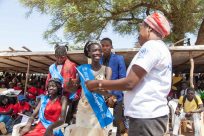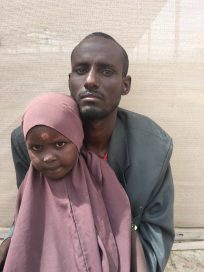Hungry for help: refugees in Kenya feel the effects of recent food cuts
KAKUMA REFUGEE CAMP, Kenya, January 9 (UNHCR) – Nyachot squints up at the midday sun above Kakuma Camp as she stirs the daily meal for her family. Before last November, the 34-year-old South Sudanese refugee could cook twice a day. But when the World Food Programme cut rations by 50 per cent that month, she feared for her children’s future.
“The food does not even last the two weeks that it should,” Nyachot told UNHCR visitors, turning to gaze at her baby son. Like thousands of other women at this camp in north-west Kenya, she relies completely on the rations she receives, in the absence of any other source of income. Full rations were later resumed on January 1, but the situation remains serious and fresh funding is needed to avert the risk of further cuts in the future.
Nyachot fled South Sudan in February last year, after fighting intensified between government forces and rebels. Desperate to save her children, she embarked upon an arduous weeklong journey that took her from her home in Maiwat, Upper Nile state to Nadapal, the border entry point to Kenya.
Her eyes filled with tears as she recalled the trauma. “I travelled by boat with about 40 other people for five long days to Juba and then took a bus from there to Nadapal,” she said. “My children were hungry and thirsty.”
When they finally arrived in Nadapal, UNHCR officials and other humanitarian agencies were there to greet them with energy biscuits and water. Later, at Kakuma’s reception centre, they received hot meals, sleeping bags and a place to sleep, before being transferred to Kakuma 4, the new settlement area for South Sudanese arrivals.
For Nyachot, finding refuge in Kakuma and receiving food assistance was a huge relief. Non-food items, such as blankets, cooking utensils, an energy stove and jerry cans, were also supplied and helped her family settle into their new home. But with the food ration cuts in November, Nyachot’s concern quickly began to grow.
In one of the nearby mud houses, Stephen and Gawar shared similar worries. They fled Pangak in South Sudan’s Jonglei state and, like Nyachot, sought refuge in Kakuma. “The situation is very bad,” observed Stephen, interviewed before full rations were resumed last week. “We eat once a day and the food can get finished after five days. Some of our people are even thinking of going back home. It is not an ideal solution, but people are desperate.”
Nyagai, their 36-year-old neighbour, concurred. “Once the rations run out, I survive by begging for food from my neighbours,” she says. “It is a shame to do so but what option do I have?”
Her friend, Nyapel, smiled sadly when she revealed that she could not breastfeed her 11-month-old son due to a medical condition. “I have to sell part of my meagre rations so as to buy milk for him. If I don’t this, then my son will not survive.”
After the ration cuts took effect in November, concerted efforts were made by World Food Programme to raise additional funding and restore full rations – and this was possible at the start of the month. But the funding situation remains uncertain and WFP and UNHCR have issued joint appeals to donors for help.
Meanwhile, UNHCR and partner NGOs continued to engage with refugees through their community leaders to assure them of continued support during November and December. These efforts were a result of the recent joint Inter-Agency Regional Appeal for the South Sudan Emergency Response.
Although refugees had been assured that this was a temporary situation, they remain concerned. “If the food cuts continue, many people will suffer, especially the elderly, the women and children,” said Gawar. Stephen believed that their hope lies with UNHCR.
As she turned back to her cooking, a glimmer of hope flickered in Nyachot’s eyes. She, at least, believed that things would get better; if not for her then at least for her children.
Page 13 of 18
-

World Humanitarian Day: UNHCR – the UN Refugee Agency, staff in Dadaab refugee camp reaffirm commitment to serving the displaced
19 Aug 2017August 19 marks World Humanitarian Day. It’s a day dedicated to paying tribute to humanitarian workers, some of whom risk their lives in humanitarian service. There are approximately 1,000 humanitarian workers in Dadaab working for over 30 organisations including over 200 work for the UN Refugee Agency. When the civil […]
-

Refugee student in Kenya selected to join First Lady’s mentorship programme
10 Aug 2017“When I met her I felt great. The First Lady did not care that I was a refugee.”
-

Refugee athletes from Kenya to compete at World Athletics Championships in London for the first time
3 Aug 2017“I see myself competing one day one time in a higher level. Right now I am participating with the champions and now this is my time I have to polish my talent and to show people in the world that a refugee can make it.”
-

Government Accredited Qualification Boosts Employment Opportunities for Students in Dadaab Refugee Camp
31 Jul 2017“I would like to start my own business in tailoring and dress-making. I believe that with the training I have received I will be able to satisfy my customers. I believe I will use my skills back home in Kismayu, Somalia, when I finally go back.”
-

Award-winning Japanese Architect, Shigeru Ban, signs deal to design new homes for thousands of refugees in Kenya
17 Jul 2017“The key thing will be to construct shelter where no or little technical supervision is required, and use materials that are locally available and eco-friendly. It’s important that the houses can be easily maintained by inhabitants.”
-

Refugees compete in World Under-18s Athletics Championships in Kenya
13 Jul 2017“This was my first time to compete in a big event. I am not used to running on a carpet so it was not very easy but I am happy.”
-

International Association of Athletics Federations (IAAF) President meets with refugee athletes in Kenya
11 Jul 2017“I aspire to be like Mo Farah. I am a big fan. My goal is to run with him in future. He is a good athlete, the way he runs and his style inspire me a lot.”
-

MoU on tertiary education for refugees signed between UNHCR and public university in Kenya
10 Jul 2017A Memorandum of Understanding (MoU) has been signed between Moi University and UNHCR, to further access to tertiary education for refugees. The MoU was signed at the university’s Nairobi campus. UNHCR supports post-secondary education for refugees in Kenya through the German funded Albert Einstein Education Initiative, which is commonly known […]
-

New Mr. and Miss World Refugee Day Crowned in Kakuma Refugee Camp
27 Jun 2017“My mother won many modelling titles and has been featured in many fashion magazines. I admire her and am grateful for her support.”
-

Voluntary Repatriation to Somalia; Bishar’s Story
23 Jun 2017Somalia is my country. It is my home. I am going to Sallagle which is safe for us. I want to do farming in Sallagle and provide for my family.
